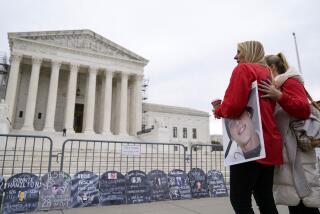Mounting Attorneys’ Fees Disturb Pioneer Investors : Finance: Law firms are seeking $2.2 million from bankrupt mortgage banking firm.
- Share via
Although investors aren’t questioning the quality of work done so far by half a dozen law firms involved in the complex Pioneer Mortgage bankruptcy case, investors are worried that, left unchecked, law firms will bleed whatever funds remain in the cash-strapped banking firm.
Those investors’ fears have grown despite the fact that firms involved in the case have submitted often-lengthy explanations for the $2.2 million in fees that were requested during a Sept. 6 hearing in U.S. Bankruptcy Judge James Meyers’ courtroom. The bills cover legal work performed from January through June.
Jones Day Reavis & Pogue, for example, which is seeking $1.3 million for work completed for Pioneer’s current management, used a 389-page accounting to detail its fees and costs.
Latham & Watkins, which submitted a $360,000 bill for legal advice provided to Pioneer’s court-approved examiner, filed an exhaustive explanation and executive summary to describe its efforts in the complex Pioneer bankruptcy.
Those kinds of explanations might suffice in a typical bankruptcy case, but they have not eased creditor fears in the highly charged atmosphere that surrounds Pioneer’s Chapter 11 bankruptcy proceedings.
Before and after hearings in Meyers’ courtroom, investors grumble about the many attorneys in the courtroom and what they see as a lack of progress. Before one recent hearing, an investor chastised attorneys for making small talk rather than talking to investors who are “paying” for the costly case.
Pioneer, based in La Mesa, had arranged $200 million in loans for more than 2,000 investors before declaring bankruptcy in January. It is uncertain how much money Pioneer investors will recoup because about $150 million of the company’s loan portfolio is no longer current.
Ironically, law firms submitted their fee requests during a Sept. 6 hearing, just minutes after Pioneer officials confirmed that the company lacked funds needed to pay attorneys and accountants for work already completed. Firms want Meyers to indicate whether he intends to eventually authorize payments.
Meyers is expected to make an interim fee decision this week. Payment is dependent upon Pioneer developing a successful plan of reorganization.
During the Sept. 6 hearing, Meyers cautioned investors that professionals’ bills are likely to climb higher as Pioneer’s new management team tries to dig out of a deep financial hole. Attorneys involved in the Pioneer case said that, although creditors usually scrutinize fees and costs, they seldom perform the kind of in-depth analysis being conducted by Pioneer’s creditors committee.
“It’s an increasingly challenging forum in which to work,” acknowledged one attorney, who like others interviewed asked that his name not be used. “I don’t blame these people for wanting to know what’s going on. . . . But they need to know that we’re not out there trying to steal from them.”
Another attorney noted that Pioneer’s elderly investor community simply isn’t used to dealing with attorneys or bankruptcy court. Most bankruptcies, the attorney said, involve business people who expect to occasionally lose funds to a bankrupt customer.
“A lot of costs . . . aren’t broken down very well,” said Dennis W. Fliehman, an attorney who was hired by the creditors committee to review bills of attorneys involved in the case. Fliehman said somewhat lax record-keeping by the law firms has caused “strong emotion concern” among Pioneer investors.
Fliehman’s report tweaks the record-keeping of one Latham & Watkins’ attorney who billed the court-approved examiner for 63 hours of work during a four-day period. Fliehman noted that, while “attorneys work long hours . . . the committee wonders about the efficiency of work done by an attorney who is billing at that pace for several days in a row.”
During one 17-hour workday, the attorney in question evidently worked from 7 a.m. to midnight “without breaks for meals, using the rest room or other normal interruptions,” according to Fliehman’s report.
Although Meyers has complimented the law firms for completed legal work, he cautioned them against submitting fee and cost reports that will serve as “lightning rods” for investors.
Meyers cautioned that, although investors will accept meal allowances for secretaries working overtime, they probably will explode if the charge turns out to be “four or five attorneys sitting around Reidy O’Neil’s (restaurant) having a nice lunch or dinner.”
Attorneys for Jones Day and Latham & Watkins on Sept. 6 defended their work and billings as appropriate. The attorneys also told Meyers that it has grown increasingly difficult for their firms to carry the liabilities on their books.
Pioneer Mortgage Bankruptcy Attorney Bills Milberg & De Phillips Attorney for Debtor (Through July 31, 1991) Fees: $111,340.00 Costs: $22,913.30 Total: $134,253.3 Leon L. Vickman Attorney for Debtor (Through May 31, 1991) Fees: $31,797.50 Costs: $1,094.94 Total: $32,892.44 Jones, Day Reavis & Pogue Attorney for Debtor (Through June 30, 1991) Fees: $1,210,747.50 Costs: $98,707.42 Total: $1,309,454.92 Baker & McKenzie Attorney for Creditors Committee (Through June 30, 1991) Fees: $31,714.00 Costs: $10,954.65 Total: $322,668.65 J. Cole Frances Court-appointed examiner (Through July 31, 1991) Fees: $84,125.00 Costs: $678.92 Total: $84,803.92 Latham & Watkins Attorney for examiner (Through June 30, 1991) Fees: $335,378.75 Costs: $24,688.85 Total: $360,067.60 Jeffrey L. Owens, CPA Hired by examiner Fees: $5,200 Source; Bankruptcy Court documents.
More to Read
Inside the business of entertainment
The Wide Shot brings you news, analysis and insights on everything from streaming wars to production — and what it all means for the future.
You may occasionally receive promotional content from the Los Angeles Times.










